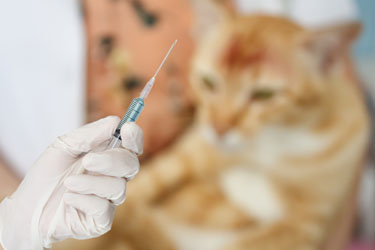Veterinarian Tips: 5 Top Pet Vaccination Questions

With all the publicity about vaccinations for humans, more and more clients are probably coming into your office and asking which vaccines are really necessary for their pet and how often should they get them.
The answer is: It depends. The type and frequency of vaccinations depends on the age, breed, and health status of the animal; the potential for disease exposure; whether the animal is used for breeding; and the geographical area where the animal lives or may visit.
Often, your office manager or receptionist may be unprepared to answer questions about vaccinations. Here are some common questions asked by pet owners and the answers you may pass on to your staff and clients.
Common Questions about Pet Vaccinations
Question #1 When should my puppy/kitten receive their first vaccinations?
Answer: Below are nationwide recommendations by the American Kennel Club. However, if certain diseases, such as hepatitis, are not present in your area, there is no need for your puppy to be vaccinated.
|
Puppy Vaccination Recommendations |
||
|
Age |
Recommended Vaccinations |
Optional Vaccinations |
|
6-8 weeks |
Distemper, measles, parainfluenza |
Bordetella |
|
10-12 weeks |
DHPP (vaccines for distemper, adenovirus [hepatitis], parainfluenza, and parvovirus) |
Coronavirus, leptospirosis, bordetella (kennel cough), Lyme disease |
|
12-24 weeks |
Rabies |
|
|
14-16 weeks |
DHPP |
Coronavirus, Lyme disease, leptospirosis |
The schedule below is for the average indoor house cat. If your kitten stays outside for significant periods of time, recommendations will change.
|
Kitten Vaccination Recommendations |
||
|
Age |
Recommended Vaccinations |
Optional Vaccinations |
|
6-7 weeks |
Combination vaccine (vaccines for feline distemper, rhinotracheitis, and calicivirus) |
|
|
10 weeks |
Combination vaccine
|
Chlamydophila (pneumonitis) included in combination vaccine where it is a concern. |
|
12 weeks or older |
Rabies |
|
|
13 weeks |
Combination vaccine
|
Chlamydophila (pneumonitis) included in combination vaccine where it is a concern. Feline leukemia (FeLV) for kittens at risk of exposure to feline leukemia virus. |
|
16 & 19 weeks |
Combination vaccine
|
FeLV for kittens at risk of exposure to feline leukemia virus. |
Question #2 What happens if my puppy or kitten misses a vaccination or booster?
Answer: It’s vitally important your young animal gets all its shots and boosters. If you miss one, schedule it as soon as possible. If you have a mature animal, being a little late shouldn’t pose a big problem though.
Question #3 If my animal is ill or has a chronic condition, should it be vaccinated?
Answer: It depends. If your veterinarian hasn’t already told you not to bring in your pet for vaccination, bring it in, but make sure to tell the veterinarian your animal is sick and its symptoms.
Question #4 How often should my pet be vaccinated?
Answer: After the initial one-year booster for puppies and kittens, your dog or cat should receive most vaccinations, including canine parvovirus (CPV), canine distemper virus (CDV), canine adenovirus (CAV), and rabies, every 3 years if they are low risk.
Recommendations for cats depend on whether vaccinations are killed or not killed, injected or intranasal. In general, after your cat has received its standard 6-month or 1-year booster, adult cats can receive the combination vaccine for feline herpesvirus 1, calicivirus, and panleukopenia, as well as the killed rabies virus, every 3 years.
Cat owners: There is clear evidence for minimizing the frequency of vaccination in felines in light of the appearance of vaccine-associated sarcomas in cats. If your cat develops a bump at the site of a vaccination, contact your veterinarian.
Question #5 How do I know if my cat or dog is having a bad reaction to a vaccine?
Answer: Just like in humans, pets may experience mild side effects that should last no longer than a day or two. They include:
- Discomfort and local swelling where they were vaccinated
- Mild fever
- Decreased appetite and activity
- Sneezing, mild coughing, "snotty nose" or other respiratory signs (may occur up to 5 days after an intranasal vaccine)
If your pet experiences any of the following, seek veterinary care immediately:
- Persistent vomiting or diarrhea
- Itchy skin that may seem bumpy ("hives")
- Swelling of the muzzle and around the face, neck, or eyes
- Severe coughing or difficulty breathing
- Collapse
As always, if you have questions or concerns, call your veterinarian.
Sources:
http://www.akc.org/content/health/articles/puppy-shots-complete-guide/
http://www.peteducation.com/article.cfm?c=1+2143&aid=951
https://www.avma.org/public/PetCare/Pages/What-to-expect-after-your-pets-vaccination.aspx
Need Regulatory Assistance
If you need help with regulatory or licensing issues, we're happy to help. We have a wide variety of resources to help you when issues arise.

Careers
Are you looking for a place to let your talents shine? At Covetrus, we help our practitioner customers better serve their patients and take pride in providing the best customer experience possible. Search our open positions to see our available opportunities.
Newsletter
Stay current with what’s going on with Covetrus, subscribe to receive our newsletter and email communications. Subscribers will receive the latest information in practice management, sales and marketing, animal health, and more.


Leave a comment